| Listing 1 - 10 of 29 | << page >> |
Sort by
|
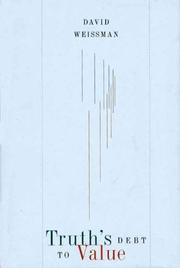
ISBN: 0300054254 Year: 1993 Publisher: New Haven ; London Yale University Press
Abstract | Keywords | Export | Availability | Bookmark
 Loading...
Loading...Choose an application
- Reference Manager
- EndNote
- RefWorks (Direct export to RefWorks)
Truth --- Valeurs (Philosophie) --- Values --- Vérité --- Waarden (Filosofie) --- Waarheid --- Axiology --- Worth --- Aesthetics --- Knowledge, Theory of --- Metaphysics --- Psychology --- Ethics --- Conviction --- Belief and doubt --- Philosophy --- Skepticism --- Certainty --- Necessity (Philosophy) --- Pragmatism --- Truth. --- Values.
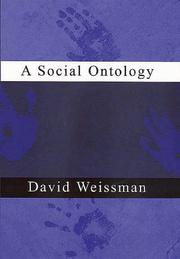
ISBN: 0300079036 9780300079036 Year: 2000 Publisher: New Haven (Conn.): Yale university
Abstract | Keywords | Export | Availability | Bookmark
 Loading...
Loading...Choose an application
- Reference Manager
- EndNote
- RefWorks (Direct export to RefWorks)
Being --- Etre (Philosophie) --- Ontologie --- Ontology --- Social systems --- Sociale systemen --- Systèmes sociaux --- Zijn (Filosofie) --- Zijnsleer --- Sociology --- System theory --- Philosophy --- Metaphysics --- Necessity (Philosophy) --- Substance (Philosophy) --- Ontology. --- Social systems.
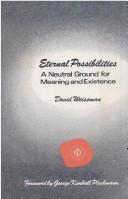
ISBN: 0809307995 Year: 1977 Publisher: Carbondale : Southern Illinois University Press,
Abstract | Keywords | Export | Availability | Bookmark
 Loading...
Loading...Choose an application
- Reference Manager
- EndNote
- RefWorks (Direct export to RefWorks)
Knowledge, Theory of --- Language and languages --- Metaphysics --- Théorie de la connaissance --- Langage et langues --- Métaphysique --- Philosophy --- Philosophie --- Knowledge, Theory of. --- Metaphysics. --- Philosophy. --- Théorie de la connaissance --- Métaphysique
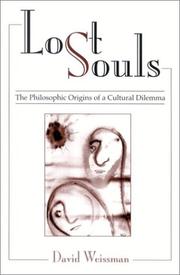
ISBN: 0791457567 0791457559 Year: 2003 Publisher: Albany State University of New York Press
Abstract | Keywords | Export | Availability | Bookmark
 Loading...
Loading...Choose an application
- Reference Manager
- EndNote
- RefWorks (Direct export to RefWorks)
Mind and body. --- Body [Human ]--Psychological aspects --- Body and mind --- Esprit et corps --- Geest en lichaam --- Mind --- Mind and body --- Mind-cure --- Somatopsychics --- Body and soul (Philosophy) --- Human body --- Mind-body connection --- Mind-body relations --- Brain --- Dualism --- Philosophical anthropology --- Holistic medicine --- Mental healing --- Parousia (Philosophy) --- Phrenology --- Psychophysiology --- Self --- Psychological aspects
Book
ISBN: 178374877X 1783748761 1783748753 9781783748778 9781783748785 1783748788 9781783748792 1783748796 9781783748808 178374880X Year: 2020 Publisher: Cambridge, England : Open Book Publishers,
Abstract | Keywords | Export | Availability | Bookmark
 Loading...
Loading...Choose an application
- Reference Manager
- EndNote
- RefWorks (Direct export to RefWorks)
"There is agency in all we do: thinking, doing, or making. We invent a tune, play, or use it to celebrate an occasion. Or we make a conceptual leap and ask more abstract questions about the conditions for agency. They include autonomy and self-appraisal, each contested by arguments immersing us in circumstances we don't control. But can it be true we that have no personal responsibility for all we think and do? Agency: Moral Identity and Free Will proposes that deliberation, choice, and free will emerged within the evolutionary history of animals with a physical advantage: organisms having cell walls or exoskeletons had an internal space within which to protect themselves from external threats or encounters. This defense was both structural and active: such organisms could ignore intrusions or inhibit risky behavior. Their capacities evolved with time: inhibition became the power to deliberate and choose the manner of one's responses. Hence the ability of humans and some other animals to determine their reactions to problematic situations or to information that alters values and choices. This is free will as a material power, not as the conclusion to a conceptual argument. Having it makes us morally responsible for much we do. It prefigures moral identity. Closely argued but plainly written, Agency: Moral Identity and Free Will speaks for autonomy and responsibility when both are eclipsed by ideas that embed us in history or tradition. Our sense of moral choice and freedom is accurate. We are not altogether the creatures of our circumstances."--Publisher's website.
Free will and determinism. --- Compatibilism --- Determinism and free will --- Determinism and indeterminism --- Free agency --- Freedom and determinism --- Freedom of the will --- Indeterminism --- Liberty of the will --- Determinism (Philosophy)
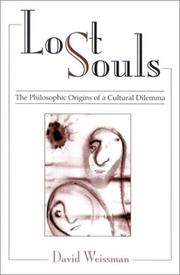
ISBN: 9781417524146 0791486710 1417524146 9781417524143 0791457559 9780791457559 0791457567 9780791457566 9780791486719 Year: 2003 Publisher: Albany State University of New York Press
Abstract | Keywords | Export | Availability | Bookmark
 Loading...
Loading...Choose an application
- Reference Manager
- EndNote
- RefWorks (Direct export to RefWorks)
Lost Souls examines the origins and consequences of the philosophic idea that mind and body are distinct. The author traces mind-body dualism from Plato, Plotinus, Augustine, and Proclus through Descartes and Kant to Nietzsche, Heidegger, Carnap, and Quine. Mind's separation from body has dominated philosophic thinking for millennia, yet most mental activities are now explained in physical terms. What are the implications if mind is material and mortal? Considering both philosophic and scientific ideas about mind, David Weissman explores our options. Rejecting the claim that the character and existence of other things are an effect of the ways we think about or perceive them, he reexamines such topics as meaning and truth, human significance, self, and society. He argues that philosophers have the rare opportunity to renew inquiry by invoking the questions that once directed them: What are we? What is our place in the world? What concerns are appropriate to being here?
Mind and body. --- Body and mind --- Body and soul (Philosophy) --- Human body --- Mind --- Mind-body connection --- Mind-body relations --- Mind-cure --- Somatopsychics --- Brain --- Dualism --- Philosophical anthropology --- Holistic medicine --- Mental healing --- Parousia (Philosophy) --- Phrenology --- Psychophysiology --- Self --- Psychological aspects --- Philosophy. --- Mental philosophy --- Humanities
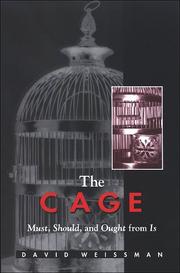
ISBN: 0791481190 1429412887 9781429412889 9780791468791 9780791481196 0791468798 Year: 2006 Publisher: Albany
Abstract | Keywords | Export | Availability | Bookmark
 Loading...
Loading...Choose an application
- Reference Manager
- EndNote
- RefWorks (Direct export to RefWorks)
Hume argued that is does not entail ought; that we cannot infer necessity or obligation from any description of actual states of affairs. His philosophical heirs continue to argue that nothing outside ourselves constrains us. The Cage maintains, contrary to Humean tradition, that reality is a set of nested contexts, each distinguished by intrinsic norms. Author David Weissman offers an innovative exploration of these norms intrinsic to human life, including practical affairs, morals, aesthetics, and culture. In this critical examination of character formation and the conditions for freedom, Weissman suggests that eliminating context (because of regarding it as an impediment to freedom) impoverishes character and reduces freedom. He concludes that positive freedom—the freedom to choose and to act—has no leverage apart from the contexts where character forms and circumstances provide opportunities to express one's thoughts, tastes, or talents.
Normativity (Ethics) --- Ethical norms --- Normativeness (Ethics) --- Ethics --- Decision making --- Moral and ethical aspects. --- Decision-making (Ethics)
Book
ISBN: 1435628934 9781435628939 0791479269 Year: 2008 Publisher: Albany State University of New York Press
Abstract | Keywords | Export | Availability | Bookmark
 Loading...
Loading...Choose an application
- Reference Manager
- EndNote
- RefWorks (Direct export to RefWorks)
Every man and woman is located in two ways. One is stolidly physical: each human body has a unique address and trajectory. The other comes with beliefs that locate us by answering a salvo of questions: Who, what, and where am I? What are my relations to other people and things? Answers come with either of two emphases. Beliefs critical to practical life and science require that we engage familiar things or find our way in strange cities and streets. Such beliefs supply meaning and security. Ascribing significance to myself or my family, religion, or state, I tell a story that locates me within a world of purpose and value. Neighbors feel and valorize their lives as I do, so our story spreads to dominate a people or an era. One procedure—inquiry—favors reality testing and truth. The other—interpretation—uses meaning to appease vulnerability and glorify believers. Beliefs of these two kinds are sometimes joined, but they are often opposed and mutually hostile. Both philosophy and culture at large confuse these ways of thinking. Styles of Thought distinguishes and clarifies them.
Interpretation (Philosophy) --- Inquiry (Theory of knowledge) --- Imagination (Philosophy) --- Philosophy & Religion --- Philosophy --- Knowledge, Theory of
Book
ISBN: 1299132421 0809381095 1441619496 9781441619495 Year: 2008 Publisher: Carbondale [Ill.] Southern Illinois University Press
Abstract | Keywords | Export | Availability | Bookmark
 Loading...
Loading...Choose an application
- Reference Manager
- EndNote
- RefWorks (Direct export to RefWorks)
In Dispositional Properties, David Weissman attacks a problem central to the philosophy of mind and, by implication, to the theory of being: Are there potentialities, capabilities, which dispose the mind to think in one way rather than another? The volume is arranged in the form of four arguments that converge upon a single point. First, there is an intricate discussion of the shortcomings of Hume's account of mind as ideas and impressions. Next comes a brief treatment of the arguments of some of Weissman's contemporaries, including Carnap and Braithwaite. Third, Wei
Mind and body. --- Knowledge, Theory of. --- Epistemology --- Theory of knowledge --- Philosophy --- Psychology --- Body and mind --- Body and soul (Philosophy) --- Human body --- Mind --- Mind-body connection --- Mind-body relations --- Mind-cure --- Somatopsychics --- Brain --- Dualism --- Philosophical anthropology --- Holistic medicine --- Mental healing --- Parousia (Philosophy) --- Phrenology --- Psychophysiology --- Self --- Psychological aspects --- Philosophy of mind. --- Mind, Philosophy of --- Mind, Theory of --- Theory of mind --- Cognitive science --- Metaphysics

ISBN: 1299132510 0809387069 1441619488 9781441619488 9780809387069 9780809307999 0809307995 9780809328703 0809328704 Year: 2008 Publisher: Carbondale Southern Illinois University Press
Abstract | Keywords | Export | Availability | Bookmark
 Loading...
Loading...Choose an application
- Reference Manager
- EndNote
- RefWorks (Direct export to RefWorks)
Eternal Possibilities: A Neutral Ground for Meaning and Existence builds on David Weissman's earlier Dispositional Properties and makes a signal contribution to the study of metaphysics. Here, broadening and enriching the point of view adopted in his earlier work, Weissman cites and criticizes a large number of theories proposed by authors from Plato to Wittgenstein and others exploring language theory and metaphysics. Students of Wittgenstein will be especially interested in Mr. Weissman's critical examination of Wittgenstein's claim in the Tractatus
Language and languages --- Metaphysics. --- Knowledge, Theory of. --- Philosophy --- God --- Ontology --- Philosophy of mind --- Epistemology --- Theory of knowledge --- Psychology --- Philosophy.
| Listing 1 - 10 of 29 | << page >> |
Sort by
|

 Search
Search Feedback
Feedback About UniCat
About UniCat  Help
Help News
News